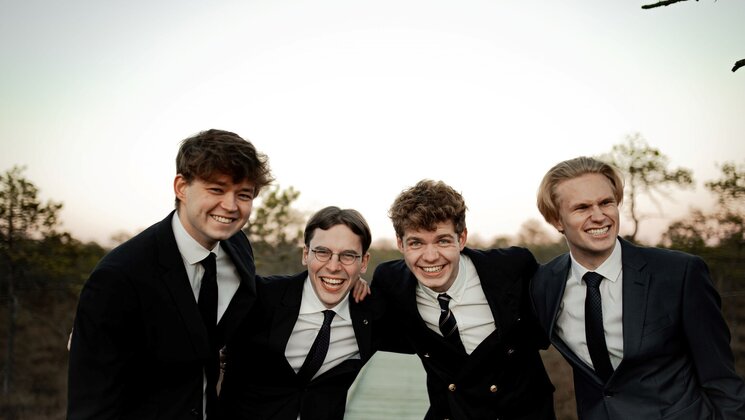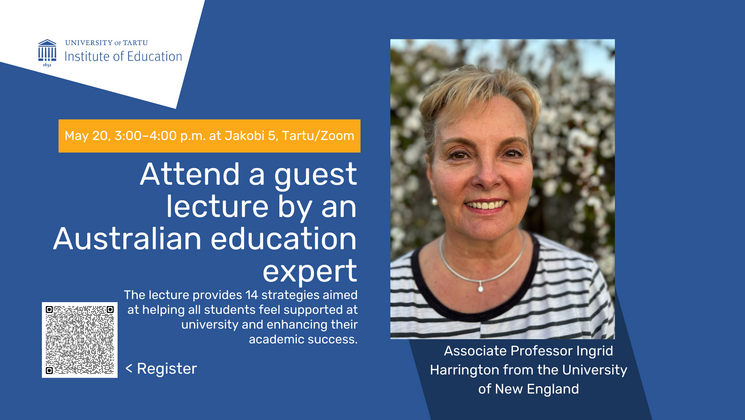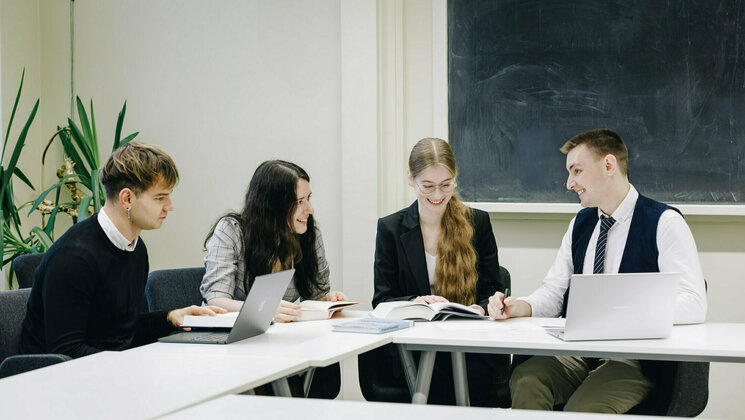-
Faculty of Arts and HumanitiesDean's Office, Faculty of Arts and HumanitiesJakobi 2, r 116-121 51005 Tartu linn, Tartu linn, Tartumaa EST0Institute of History and ArchaeologyJakobi 2 51005 Tartu linn, Tartu linn, Tartumaa EST0Institute of Estonian and General LinguisticsJakobi 2, IV korrus 51005 Tartu linn, Tartu linn, Tartumaa EST0Institute of Philosophy and SemioticsJakobi 2, III korrus, ruumid 302-337 51005 Tartu linn, Tartu linn, Tartumaa EST0Institute of Cultural ResearchÜlikooli 16 51003 Tartu linn, Tartu linn, Tartumaa EST0Institute of Foreign Languages and CulturesLossi 3 51003 Tartu linn, Tartu linn, Tartumaa EST0School of Theology and Religious StudiesÜlikooli 18 50090 Tartu linn, Tartu linn, Tartumaa EST0Viljandi Culture AcademyPosti 1 71004 Viljandi linn, Viljandimaa EST0Professors emeriti, Faculty of Arts and Humanities0Associate Professors emeriti, Faculty of Arts and Humanities0Faculty of Social SciencesDean's Office, Faculty of Social SciencesLossi 36 51003 Tartu linn, Tartu linn, Tartumaa EST0Institute of EducationJakobi 5 51005 Tartu linn, Tartu linn, Tartumaa EST0Johan Skytte Institute of Political StudiesLossi 36, ruum 301 51003 Tartu linn, Tartu linn, Tartumaa EST0School of Economics and Business AdministrationNarva mnt 18 51009 Tartu linn, Tartu linn, Tartumaa EST0Institute of PsychologyNäituse 2 50409 Tartu linn, Tartu linn, Tartumaa EST0School of LawNäituse 20 - 324 50409 Tartu linn, Tartu linn, Tartumaa EST0Institute of Social StudiesLossi 36 51003 Tartu linn, Tartu linn, Tartumaa EST0Narva CollegeRaekoja plats 2 20307 Narva linn, Ida-Virumaa EST0Pärnu CollegeRingi 35 80012 Pärnu linn, Pärnu linn, Pärnumaa EST0Professors emeriti, Faculty of Social Sciences0Associate Professors emeriti, Faculty of Social Sciences0Faculty of MedicineDean's Office, Faculty of MedicineRavila 19 50411 Tartu linn, Tartu linn, Tartumaa ESTInstitute of Biomedicine and Translational MedicineBiomeedikum, Ravila 19 50411 Tartu linn, Tartu linn, Tartumaa ESTInstitute of PharmacyNooruse 1 50411 Tartu linn, Tartu linn, Tartumaa ESTInstitute of DentistryL. Puusepa 1a 50406 Tartu linn, Tartu linn, Tartumaa ESTInstitute of Clinical MedicineL. Puusepa 8 50406 Tartu linn, Tartu linn, Tartumaa ESTInstitute of Family Medicine and Public HealthRavila 19 50411 Tartu linn, Tartu linn, Tartumaa ESTInstitute of Sport Sciences and PhysiotherapyUjula 4 51008 Tartu linn, Tartu linn, Tartumaa ESTProfessors emeriti, Faculty of Medicine0Associate Professors emeriti, Faculty of Medicine0Faculty of Science and TechnologyDean's Office, Faculty of Science and TechnologyVanemuise 46 - 208 51003 Tartu linn, Tartu linn, Tartumaa ESTInstitute of Computer ScienceNarva mnt 18 51009 Tartu linn, Tartu linn, Tartumaa ESTInstitute of GenomicsRiia 23b/2 51010 Tartu linn, Tartu linn, Tartumaa ESTEstonian Marine Institute0Institute of PhysicsInstitute of ChemistryRavila 14a 50411 Tartu linn, Tartu linn, Tartumaa EST0Institute of Mathematics and StatisticsNarva mnt 18 51009 Tartu linn, Tartu linn, Tartumaa EST0Institute of Molecular and Cell BiologyRiia 23, 23b - 134 51010 Tartu linn, Tartu linn, Tartumaa ESTTartu ObservatoryObservatooriumi 1 61602 Tõravere alevik, Nõo vald, Tartumaa EST0Institute of TechnologyNooruse 1 50411 Tartu linn, Tartu linn, Tartumaa ESTInstitute of Ecology and Earth SciencesJ. Liivi tn 2 50409 Tartu linn, Tartu linn, Tartumaa ESTProfessors emeriti, Faculty of Science and Technology0Associate Professors emeriti, Faculty of Science and Technology0Institute of BioengineeringArea of Academic SecretaryHuman Resources OfficeUppsala 6, Lossi 36 51003 Tartu linn, Tartu linn, Tartumaa EST0Area of Head of FinanceFinance Office0Area of Director of AdministrationInformation Technology Office0Administrative OfficeÜlikooli 18A (III korrus) 51005 Tartu linn, Tartu linn, Tartumaa EST0Estates Office0Marketing and Communication OfficeÜlikooli 18, ruumid 102, 104, 209, 210 50090 Tartu linn, Tartu linn, Tartumaa EST0Area of Vice Rector for DevelopmentCentre for Entrepreneurship and InnovationNarva mnt 18 51009 Tartu linn, Tartu linn, Tartumaa EST0University of Tartu Natural History Museum and Botanical GardenVanemuise 46 51003 Tartu linn, Tartu linn, Tartumaa EST0International Cooperation and Protocol Office0University of Tartu MuseumLossi 25 51003 Tartu linn, Tartu linn, Tartumaa EST0Area of RectorRector's Strategy OfficeInternal Audit OfficeArea of Vice Rector for Academic AffairsOffice of Academic Affairs0University of Tartu Youth AcademyUppsala 10 51003 Tartu linn, Tartu linn, Tartumaa EST0Student Union OfficeÜlikooli 18b 51005 Tartu linn, Tartu linn, Tartumaa EST0Centre for Learning and TeachingArea of Vice Rector for ResearchUniversity of Tartu LibraryW. Struve 1 50091 Tartu linn, Tartu linn, Tartumaa EST0
Two Teaming centres of excellence at the University of Tartu will create attractive opportunities for young researchers and boost innovation

The Teaming centres of excellence in digitalised bioengineering and personalised medicine at the University of Tartu are expected to become lighthouses in the region, attracting the best scientists and bringing change to the innovation landscape nationally and internationally.
Implementing the projects, which officially started work in Tartu on 1 September, is a great honour and also a responsibility for the University of Tartu. “As the Estonian national university, the University of Tartu carries the responsibility of addressing society's grand challenges and driving the knowledge-based society. The university contributes to sustainable development goals and tackles societal issues, including those related to public health and the green transition,” said the Rector of the university Toomas Asser at the projects’ kick-off event on 11 September. The Teaming centres of excellence are significant in fulfilling both national and international aims.
On the one hand, they will facilitate a leap forward in developing the research field of digitalised bioengineering and personalised medicine by creating fantastic career opportunities for internationally competitive young researchers. On the other hand, these centres are expected to help create new technologies and research-intensive start-ups and have an excellent spillover effect on the region.
Large-scale interdisciplinary cooperation
The Estonian Minister of Education and Research Kristina Kallas emphasised that Estonia has much work to do to bridge the gap between research results and putting them into practical use. “I hope these centres can put one and one together and get three. I fully support the ambition of large-scale interdisciplinary and international cooperation to make up a new combination of different fields and partners. Some have not cooperated before and will get much added value as a result,” said Kallas.
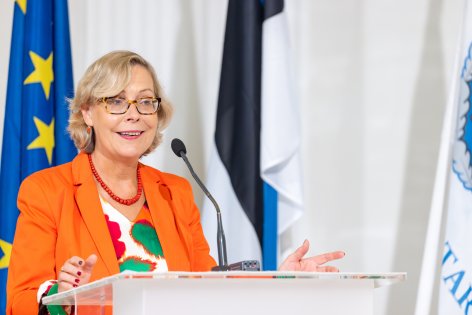
There are high expectations that the centres of excellence will be much more than just projects. Signe Ratso, Deputy Director-General for Research and Innovation at the European Commission, said that the Widening measures have had a positive effect both on reforming the R&D systems of the Widening countries and making Europe stronger as a whole. “Our recent analyses indicate that half of the previous Teaming centres of excellence have influenced national legislation, national R&I strategies or funding initiatives. These scientific excellences have been impactful in increasing links between European and international research institutions,” said Ratso, stating that there is no one-size-fits-all solution for making the best out of the centres of excellence. Instead, each centre works best when adjusting to the needs of the scientific discipline in a parent organisation but also of the country or region. Ratso encouraged the university to support the two new Teaming centres of excellence in finding the best way to make them sustainable even after the initial starting period.
International influence in health care and green transition
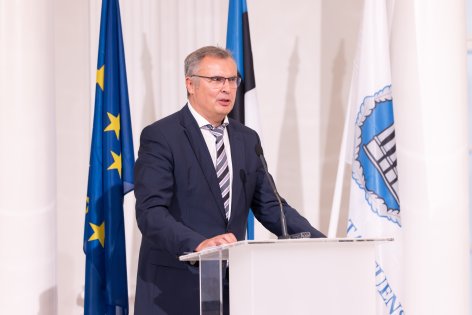
Stefan Weiers, Head of Sector at the Directorate-General for Research and Innovation at the European Commission, mentioned that the Estonian Teaming projects can significantly influence European research missions. TeamPerMed, as an interdisciplinary consortium, has the full chain of research from the basic science on a molecular level to the practical solutions for clinical medicine. “It could have great importance for the cancer mission of the European Commission framework programme,” said Weiers. The other project, DigiBio, is highly valued thanks to its significant industrial potential through bringing together big data, high-performance computing and bioengineering.
Weiers also mentioned that the Teaming projects have the potential to push forward the host country in general on the R&I landscape. “Estonia is already the best student in the class of Widening countries and catching up with the advanced countries. But the situation is still quite fragile. The two Teaming projects will contribute a lot to help to keep this good position and enable to do even better in the coming years,” said Weiers.
The Centre for Digital Bioengineering and the Research and Development Centre for Personalised Medicine received Estonia's largest research funding at the beginning of this year. The six-year projects are funded by the European Commission and the Estonian state with a total of €60 million. The European Commission supports the projects from the Teaming for Excellence action under the research and innovation funding programme Horizon Europe. The programme supports collaborative projects between European research institutions to deliver cutting-edge research and better integrate it into society and the economy.
Video of the event:
Read more similar news




